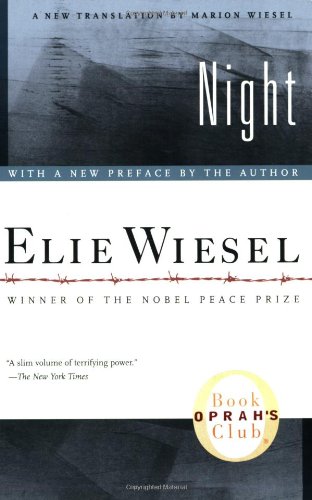All Nonfiction
- Bullying
- Books
- Academic
- Author Interviews
- Celebrity interviews
- College Articles
- College Essays
- Educator of the Year
- Heroes
- Interviews
- Memoir
- Personal Experience
- Sports
- Travel & Culture
All Opinions
- Bullying
- Current Events / Politics
- Discrimination
- Drugs / Alcohol / Smoking
- Entertainment / Celebrities
- Environment
- Love / Relationships
- Movies / Music / TV
- Pop Culture / Trends
- School / College
- Social Issues / Civics
- Spirituality / Religion
- Sports / Hobbies
All Hot Topics
- Bullying
- Community Service
- Environment
- Health
- Letters to the Editor
- Pride & Prejudice
- What Matters
- Back
Summer Guide
- Program Links
- Program Reviews
- Back
College Guide
- College Links
- College Reviews
- College Essays
- College Articles
- Back
Night by Elie Wiesel
Night
Night is the type of phenomenal book that leaves you breathless in the end, yet not because of its plot. Instead, you read the shocking first-hand account of reality for the thousands of “outsiders” in the 1940’s. It is a small novel that creates huge impact, for you cannot help but feel for the young boy who was thrust into a living nightmare, a nightmare that so many never left alive, but rather escaped through the then forgiving embrace of death. It is this shocking realization of the horrors that encompassed these thousands, not gently thrust upon you, in a sometimes haunting prose that makes this book a stunning read.
Night is, in short, an autobiography of the author, Elie Wiesel, during his teenage years, discovering the terrible fate that Hitler planned for the Jews across Europe. He and his family lived peacefully in Sighet, Transylvania where religion was a large part of his life and his tie to Moishe the Beadle. However, when this old friend disappeared, nobody thought anything of it, even when he returned bearing tales of the Nazis and their horrors coming ever closer. His people were in denial, and it would be their downfall.
It would not be long until the soldiers came, forcing them into the cattle cars, and later, into Auschwitz-Birkenau. There, families are separated, with only so many narrowly making it through that first selection. These survivors know then, as they see the ominous furnaces, as they are assigned to the barracks with muddy floors, as they are stripped of everything, that the world, including themselves, had been in denial of what went on in the secretive camps led by the Nazis. From this point, Elie writes about everything he saw, the people he met, and the darkness that seemed to perforate into everything he did. Somehow, throughout the course of a merely 100 page book, you see everything, feeling the transformation, the doubts of the God that he was imprisoned for believing in, of this teenager in the Holocaust.
I admit, it is a sad book, written with a feeling of detachment that reveals the author’s pain if he were to revel in the events of his childhood. Yet, while this may take some getting used to, it is worth the read to experience those moments as you lie in bed late at night, holding your breath as you are unable to comprehend the things that you are reading. While some may not like it, whether for the sadness or the style, I believe that everyone should appreciate it, at least for the stark reality of the horrors that occurred.
Similar Articles
JOIN THE DISCUSSION
This article has 0 comments.

